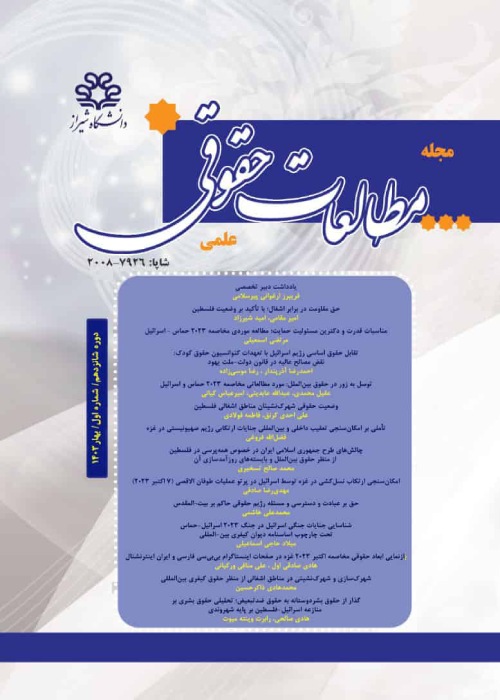From Humanitarian Law to Anti-Discrimination Law: A Human Rights Analysis of the Israeli-Palestinian Conflict Based on Citizenship
The Israeli-Palestinian conflict remains a complex and intractable dispute with profound human rights implications. The dominant approach, grounded in the legal framework of humanitarian law and the two-state solution, has yielded limited progress towards resolving the conflict or securing fundamental Palestinian rights. This paper argues that an alternative framework, based on anti-discrimination law principles, offers a more comprehensive and effective lens for analyzing the conflict and pursuing a just resolution.
The prevailing narrative in Western discourse portrays Israel as a legitimate state established in accordance with international law and bolstered by the UN partition plan in 1947. This narrative emphasizes the Jewish right to self-determination within the newly created state. Palestinians, under this view, are either refugees who should be resettled elsewhere or an occupied population with the future right to establish their own state alongside Israel (the two-state solution).
However, a growing body of scholarship and activism challenges this dominant narrative. This counter-narrative argues that Israel's creation constituted an act of dispossession and displacement of the Palestinian people. It views Israel as an apartheid system marked by systematic discrimination against Palestinians on the basis of race and ethnicity. This systemic discrimination manifests in the denial of Palestinian citizenship rights, including the right to self-determination, voting rights, freedom of movement and expression, and equal access to resources and property ownership.
The dominant approach to the conflict relies heavily on the framework of humanitarian law, particularly the Fourth Geneva Convention. This framework recognizes the occupied status of the Palestinian territories and mandates that Israel, as the occupying power, uphold certain basic rights of the Palestinian population. While these principles are crucial for protecting Palestinians from the immediate harms of occupation, the framework has significant limitations.
Firstly, the humanitarian law framework focuses primarily on regulating the conduct of hostilities and protecting civilians during armed conflict. It has limited capacity to address issues of systemic discrimination and denial of fundamental rights, such as citizenship and self-determination, that lie at the core of the conflict.
Secondly, the humanitarian law framework treats the situation as a temporary one. Its ultimate goal is the cessation of hostilities and eventual withdrawal of the occupying power. It offers a limited vision for a final solution that guarantees lasting peace and full recognition of Palestinian rights.
The anti-discrimination law approach offers a more comprehensive framework for analyzing the Israeli-Palestinian conflict. It draws from international human rights instruments, including the International Convention on the Elimination of All Forms of Racial Discrimination (ICERD), to examine the denial of Palestinian citizenship rights. This approach highlights the structural inequalities embedded within the Israeli system that disadvantage Palestinians based on their national origin and ethnicity.
By focusing on citizenship and equality, the anti-discrimination law approach challenges the legitimacy of a system that denies basic rights to a significant portion of its population. It sheds light on the ways in which Israel maintains a Jewish majority state through discriminatory policies and practices in areas such as land allocation, movement restrictions, and access to social services.
Comparisons have increasingly been drawn between the Israeli-Palestinian situation and the former apartheid regime in South Africa. Both cases share features of racialized systems of domination, where one group enjoys privileges and political power while the other is marginalized and denied basic rights. The South African case provides a historical precedent for dismantling an apartheid system and transitioning to a more inclusive democracy based on equal citizenship.
The international community's successful application of boycotts, divestment, and sanctions (BDS) against South Africa demonstrates the effectiveness of collective action in pressuring a discriminatory state to change course. Advocates for Palestinian rights increasingly utilize the BDS movement as a tool to hold Israel accountable for its violations of international law and human rights principles.
While the anti-discrimination law approach offers a more promising framework for addressing the Israeli-Palestinian conflict, challenges remain. One key challenge is the entrenched power dynamics and the strong political and financial support Israel receives from some Western countries.
Secondly, achieving a just and sustainable solution will require a willingness on both sides to compromise and negotiate in good faith. Palestinians must be able to exercise their right to self-determination, while legitimate Israeli security concerns must also be addressed.
The adoption of an anti-discrimination law approach can be instrumental in guiding international efforts to resolve the conflict. This approach necessitates:
Increased international pressure:The international community needs to hold Israel accountable for its violations of Palestinian rights and international law. This includes actively supporting measures such as the BDS movement and imposing targeted sanctions.
Meaningful negotiations:A genuine commitment to peace requires a return to meaningful negotiations based on the principle of a two-state solution with land swaps, or a single democratic state
- حق عضویت دریافتی صرف حمایت از نشریات عضو و نگهداری، تکمیل و توسعه مگیران میشود.
- پرداخت حق اشتراک و دانلود مقالات اجازه بازنشر آن در سایر رسانههای چاپی و دیجیتال را به کاربر نمیدهد.


